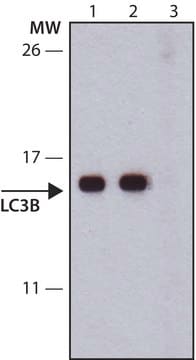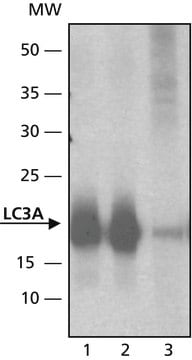SAB1305552
MONOCLONAL ANTI-LC3 (APG8) antibody produced in mouse
clone 166AT1234, IgG fraction of antiserum, buffered aqueous solution
Sinónimos:
Autophagy-related protein LC3 A, Autophagy-related ubiquitin-like modifier LC3 A, MAP1 light chain 3-like protein 1, MAP1LC3A, Microtubule-associated proteins 1A/1B light chain 3A
About This Item
Productos recomendados
biological source
mouse
Quality Level
antibody form
IgG fraction of antiserum
antibody product type
primary antibodies
clone
166AT1234, monoclonal
form
buffered aqueous solution
mol wt
14272 Da
species reactivity
rat, mouse, human
technique(s)
immunofluorescence: 1:25
immunohistochemistry: 1:50-1:100
western blot: 1:1000
isotype
IgG1κ
NCBI accession no.
UniProt accession no.
shipped in
wet ice
storage temp.
−20°C
target post-translational modification
unmodified
Gene Information
human ... MAP1LC3A(84557)
Categorías relacionadas
Physical form
Disclaimer
¿No encuentra el producto adecuado?
Pruebe nuestro Herramienta de selección de productos.
Storage Class
10 - Combustible liquids
flash_point_f
Not applicable
flash_point_c
Not applicable
Certificados de análisis (COA)
Busque Certificados de análisis (COA) introduciendo el número de lote del producto. Los números de lote se encuentran en la etiqueta del producto después de las palabras «Lot» o «Batch»
¿Ya tiene este producto?
Encuentre la documentación para los productos que ha comprado recientemente en la Biblioteca de documentos.
Los clientes también vieron
Nuestro equipo de científicos tiene experiencia en todas las áreas de investigación: Ciencias de la vida, Ciencia de los materiales, Síntesis química, Cromatografía, Analítica y muchas otras.
Póngase en contacto con el Servicio técnico














